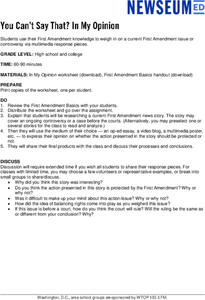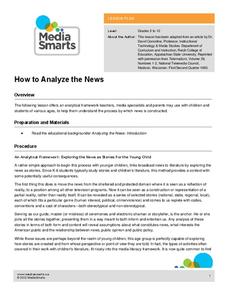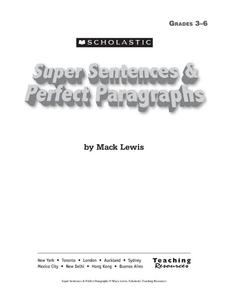Curated OER
Form an Opinion Based on Facts
Explore fact and opinion through higher level thinking and literacy. Kids listen to the beginning of A Picture Book of Helen Keller by David A. Adler and identify facts in the text. They follow along as the teacher models how to form an...
Curated OER
Facts and Opinions in a Variety of Genres
Here is a lesson dedicated to helping learners understand the differences between facts and opinions. They examine the first page of several books from the class library to determine if the book is fact or opinion based. A Venn diagram...
Curated OER
The Buzz about Fact and Opinion
Learners distinguish facts from opinions. In this biological science lesson plan, students research information on bees to decipher what things are proven true versus assumed. They view a video and discuss what makes the information...
Curated OER
Understanding and Using Primary and Secondary Sources in History
Explore primary and secondary sources in this historical analysis instructional activity. Young researchers define the terms primary source and secondary source. They read a primary source document provided by the teacher and answer...
Curated OER
Identifying Facts
Students evaluate what a fact is and what the characteristics of a fact are. In this fact and opinion lesson, students read through chapters in their books and point out facts that they find that cannot be disputed.
Curated OER
Persuasive Writing Skills Worksheets
What makes you want to buy that new car? Or vote for that popular politician? Study the persuasive techniques commonly found in advertisements or argumentative writing, including repetition, exaggeration, and fact vs. opinion.
Curated OER
Is That a Fact?
Students write examples of facts and opinions on the board. In groups, they develop their own definitions for facts and opinions and share with the class. In new groups, they complete a worksheet in which they place statements into the...
Curated OER
Fighting Fake News
Fake news. Alternative facts. Internet trolls. In an age of Newspeak, it's increasingly important to equip 21st century learners with the skills needed to determine the legitimacy of claims put forth on social media, in print, and in...
Curated OER
Writing a News Article
Join the newspaper business with a series of lessons and exercises focused on elements of journalism. The packet focuses on distinguishing fact from opinion, writing effective headlines, sequencing events, and editing and proofreading a...
Curated OER
School Newspaper
Fifth graders run a school newspaper on a school website and discover how to use various literary forms as they relate to the writing process. In this school newspaper instructional activity, 5th graders synthesize information from...
Teaching Tolerance
Where We Stand
Everyone is entitled to their own opinion. Academics learn strategies to share their opinions and agree or disagree with others in a respectful manner. The resource provides scenarios to help individuals form opinions and share them with...
Curated OER
Author's Opinion
Students complete a worksheet. In this author's opinion lesson, students learn how to determine an author's opinion when it is not explicitly stated in the text. Students answer fact and opinion questions and use them to draw...
Media Smarts
Authentication Beyond the Classroom
In an age of fake news, alternative facts, and Internet trolls it is essential that 21st Century learners develop the skills they need to authenticate the facts in viral news. Here is a great way to begin with a resource that provides...
Newseum
You Can’t Say That: In My Opinion
As a part of a study of the First Amendment, high schoolers research a current news story that seems to involve one of the freedoms granted by the First Amendment. Investigators decide whether they think the action presented in the story...
Newseum
Weighing the Arguments
To understand how personal perspectives can affect policy and politics, scholars examine the woman suffrage media map and historical artifacts to analyze arguments for and against women's suffrage. Class members then take on the role of...
Curated OER
Fact and Opinion
Sixth graders discuss the terms "explicit opinions," and "implicit opinions," from a text. In this literacy lesson, 6th graders analyze the author's techniques to find explicitly stated opinions. Additionally, students complete a...
Curated OER
Just the Facts, Jack
Third graders listen to music and discuss their responses to different styles separating their comments into facts and opinions. They evaluate a worksheet of statements by classifying the statements into fact and opinion.
Media Smarts
How to Analyze the News
Teach kids how to watch television, specifically the news, with this creative idea for learners of all ages from the Media Awareness Network. The elementary school plan focuses on presenting news as a story and uses Jon Scieszka's story...
Curated OER
Farming: It's a Fact
Understanding where our food and textiles come from is key to understanding business, economics, and the importance of modern agriculture. Learners play a game, read text to determine farm fact from opinion, and itemize a grocery receipt...
Curated OER
Fact and Opinion
In this writing worksheet, students identify and describe the difference between a fact and an opinion. They place the cut-up words from the house ad in the correct column to indicate if they are fact or opinion.
Curated OER
Fact
Students read about polar bears and discuss and identify the facts they learn about them. In this facts lesson plan, students explain why their facts are not opinions.
The New York Times
Evaluating Sources in a ‘Post-Truth’ World: Ideas for Teaching and Learning about Fake News
The framers of the United States Constitution felt a free press was so essential to a democracy that they granted the press the protection it needed to hold the powerful to account in the First Amendment. Today, digital natives need to...
Scholastic
Super Sentences & Perfect Paragraphs
An extensive collection of lessons and activities includes many writing, grammar, and proofreading exercises. With templates and worksheets that cover several steps in the writing process, from sentence to paragraph to essay, this...
Scholastic
Consider the Source
Who is more trustworthy when it comes to marijuana: a high school student, or The National Institute on Drug Abuse? Sources matter when reading informational text. Help teenagers discern which facts are true with an activity that focuses...

























